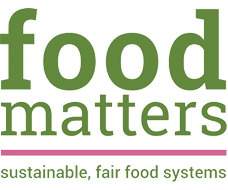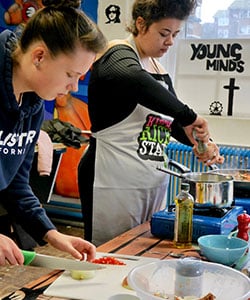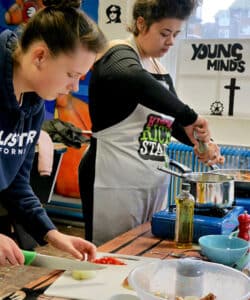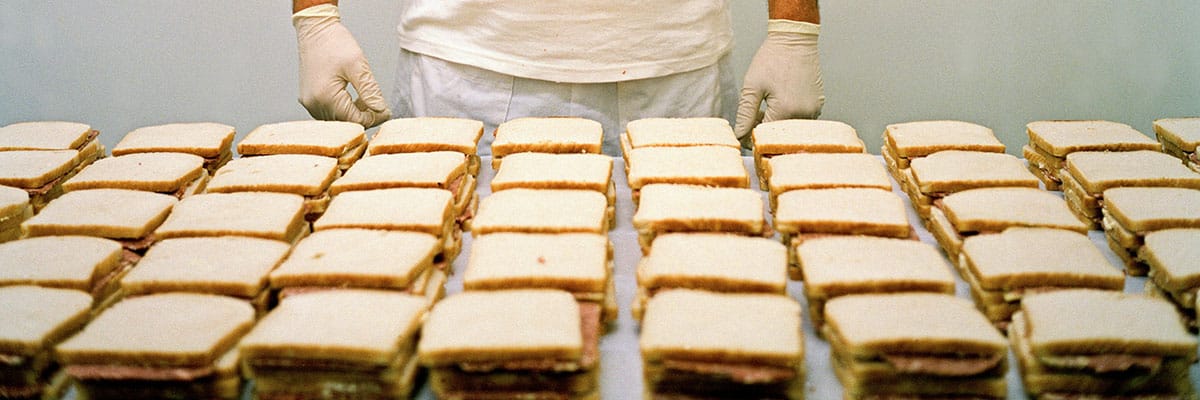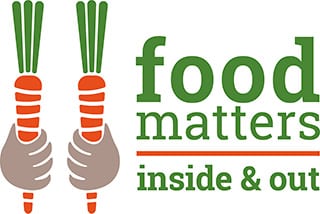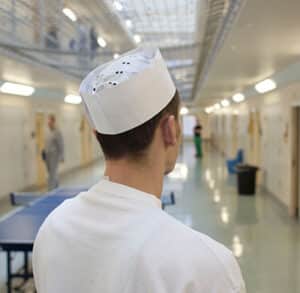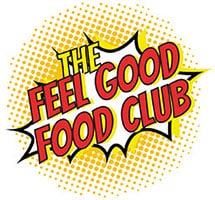I once met an Englishwoman who could understand fluent French but she wasn’t able to speak it because of a lack of confidence. That’s why our cooking programmes are about more than just knowing how to cook.
We work with the homeless, young families, young adults leaving care, those with mental health issues and people in, or at risk of being in, the criminal justice system. The courses we deliver reflect the needs of the community group we are working with, whether that’s managing a food budget, cooking with limited equipment or simply gaining confidence to try new recipes.
“The sessions are about more than the food, they’re a lot about independence. It really has helped out. [The government] fund food education in schools, so why shouldn’t they do it for people outside of schools, who live alone, who never really have the access to education or family support or even a kitchen to cook in?”
~ Kitchen Kickstart Participant
Collaborative design
It’s important to us that the courses and programmes we offer are actually of use to the groups and individuals we offer them to. Each programme we run is designed alongside the user group. This means really understanding their life situations, gaining feedback on what they want to learn and running pilots that allow us to adjust what we do depending on the feedback we get. By focussing the design on the participant, it is more likely that they will experience long lasting behaviour change. The overarching aim is to deliver a programme of courses that reflects the needs of vulnerable communities in order that they can access a healthy diet.
“I feel more confident cooking dishes as well as making the meals healthier”
~ Kitchen Kickstart Participant
Participants learn a range of skills and techniques including kitchen skills, cooking methods, basics of a balanced diet, cooking from scratch, budgeting and shopping skills, and social eating.
Understanding food poverty
We are lucky enough to have a team of staff who have years of experience working with communities experiencing food poverty. That means we understand the issues families and individuals face trying to eat an affordable healthy diet. Whenever a household is struggling to pay their bills, their food bill is the only real flexible budget they can cut back on, which often leads to people in the household skipping meals or eating cheap and unhealthy food. Many people in the UK rely on foodbanks to help them out when their food budget is cut completely.
The courses
All courses are hands on and very practical. They help people who don’t feel confident about cooking to develop basic skills to cook from scratch, using low-cost ingredients that can be bought locally at corner shops, to create meals and snacks that are healthy and appetising. Some courses might also focus more on diet and wellbeing, especially for those inside the criminal justice system who might not have the freedom to shop and cook for themselves.
A large focus of all our courses is the link between diet and mental health. Eating well isn’t just about your physical health, it can also have a huge impact on how you feel emotionally and your ability to think, learn and cope with life’s challenges. What all the courses have in common, is promoting the mental health benefits of eating together socially.
To find out more about our courses go to ‘Food and Criminal Justice’ , ‘Kitchen Kickstart’, ‘Budget Bites’ and ‘FAB! Food and Wellbeing’
I once met an Englishwoman who could understand fluent French but she wasn’t able to speak it because of a lack of confidence. That’s why our cooking programmes are about more than just knowing how to cook.
We work with the homeless, young families, young adults leaving care, those with mental health issues and people in, or at risk of being in, the criminal justice system. The courses we deliver reflect the needs of the community group we are working with, whether that’s managing a food budget, cooking with limited equipment or simply gaining confidence to try new recipes.
“The sessions are about more than the food, they’re a lot about independence. It really has helped out. [The government] fund food education in schools, so why shouldn’t they do it for people outside of schools, who live alone, who never really have the access to education or family support or even a kitchen to cook in?”
~ Kitchen Kickstart Participant
Collaborative design
It’s important to us that the courses and programmes we offer are actually of use to the groups and individuals we offer them to. Each programme we run is designed alongside the user group. This means really understanding their life situations, gaining feedback on what they want to learn and running pilots that allow us to adjust what we do depending on the feedback we get. By focussing the design on the participant, it is more likely that they will experience long lasting behaviour change. The overarching aim is to deliver a programme of courses that reflects the needs of vulnerable communities in order that they can access a healthy diet.
“I feel more confident cooking dishes as well as making the meals healthier”
~ Kitchen Kickstart Participant
Participants learn a range of skills and techniques including kitchen skills, cooking methods, basics of a balanced diet, cooking from scratch, budgeting and shopping skills, and social eating.
Understanding food poverty
We are lucky enough to have a team of staff who have years of experience working with communities experiencing food poverty. That means we understand the issues families and individuals face trying to eat an affordable healthy diet. Whenever a household is struggling to pay their bills, their food bill is the only real flexible budget they can cut back on, which often leads to people in the household skipping meals or eating cheap and unhealthy food. Many people in the UK rely on foodbanks to help them out when their food budget is cut completely.
The courses
All courses are hands on and very practical. They help people who don’t feel confident about cooking to develop basic skills to cook from scratch, using low-cost ingredients that can be bought locally at corner shops, to create meals and snacks that are healthy and appetising. Some courses might also focus more on diet and wellbeing, especially for those inside the criminal justice system who might not have the freedom to shop and cook for themselves.
A large focus of all our courses is the link between diet and mental health. Eating well isn’t just about your physical health, it can also have a huge impact on how you feel emotionally and your ability to think, learn and cope with life’s challenges. What all the courses have in common, is promoting the mental health benefits of eating together socially.
To find out more about our courses go to ‘Food and Criminal Justice’ , ‘Kitchen Kickstart’, ‘Budget Bites’ and ‘FAB! Food and Wellbeing’
